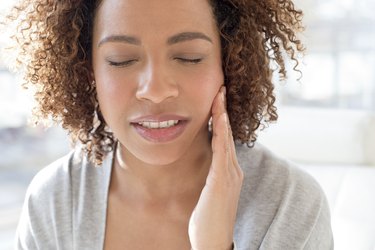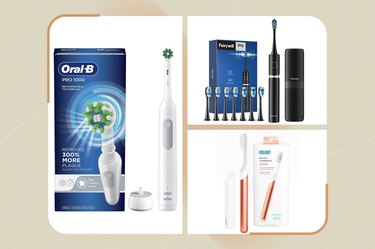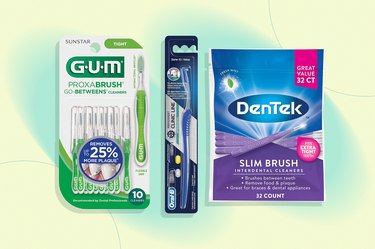
Sore, tender gums can be distracting, to say the least, and it can even be difficult to eat or drink normally when you've got gum pain.
Luckily, most types of gum pain resolve on their own with a little time, while others can benefit from over-the-counter treatments and home care. But regardless of what you think might be causing your pain, don't dismiss or ignore your symptoms — especially if they don't improve or get worse.
Video of the Day
Video of the Day
"The oral cavity is the gateway to the rest of the body, so oral health can affect general health and vice versa," says Gary Goldman, DDS, Chief Dental Officer and Faculty Chair at the DC Institute based in Toronto.
Here's how to figure out what might be making your gums hurt, plus the steps to take at home (and with the help of your dentist or periodontist) to feel better.
1. You're Flossing Incorrectly (or Not Enough)
Poor flossing habits can result in painful, tender gums for a few different reasons, says Sheila Samaddar, DDS, FACD, president of the District of Columbia Academy of General Dentistry and national spokesperson for the Academy of General Dentistry.
One common culprit? Flossing too aggressively. "You could be putting too much pressure on the gums when cleaning," she says. Brushing your teeth too harshly could also irritate the surrounding gums.
You also might not be flossing enough, says Jeff Rappaport, DDS, Chief Dental Advisor at quip. If you notice your gums are bleeding after flossing and you haven't been flossing regularly, you likely have some plaque buildup, he explains.
Fix It
Make sure to practice good oral health habits. The American Dental Association (ADA) recommends brushing your teeth twice a day and cleaning between teeth with floss once a day.
If you're experiencing painful gums often, consider flossing more gently or asking your dentist for a refresher. You could also try using a water flosser instead of string.
"It's not normal to have gum pain after flossing, so try not to use too much pressure," says Dr. Rappaport. "Remember, your gums are sensitive — be gentle with the string when maneuvering around each tooth."
2. You Injured Your Gums
If your gums hurt in one spot, it's possible you've injured the gum tissue. Chewing crunchy foods can sometimes cause this to happen, Dr. Samaddar says, as can a food particle from a hard or dense food that's become lodged in your teeth.
Another possibility? "Buildup that was never flossed or brushed out could be adhered to a tooth in the adjacent spot and be allowing more debris to attach," she says.
Fix It
"Once something sits in there for a few days or weeks, it can become a rock-hard substance that attaches to the teeth like cement and is difficult remove on your own," says Dr. Samaddar.
If the pain doesn't improve, reach out to your dentist.
3. You Have a Canker Sore
Also called mouth ulcers, these small sores look white or gray with a red border, according to the ADA. Canker sores generally appear on the inside of the lips, cheeks or tongue, but it's also possible to develop them on your gums.
Fix It
The good news is that canker sores aren't contagious and usually heal on their own within a few weeks.
To ease the pain in the meantime, the National Institute of Dental and Craniofacial Research at the National Institutes of Health recommends rinsing your mouth with over-the-counter antiseptics or using an over-the-counter gel (a popular one is Orajel; $5.99, Amazon) to numb the area.
Many experts also recommend natural remedies for canker sores like avoiding spicy foods and swishing milk of magnesia.
4. You Recently Had a Dental Cleaning
It's not unusual for gums to hurt after a dental cleaning. During a cleaning, the soft tissue of your gums needs to be manipulated to access — and get rid of— any debris, Dr. Samaddar says.
You're more likely to experience gum pain if you had a lot of buildup on your teeth or had skipped or delayed a checkup. "A thorough cleaning can cause inflammation if there is plaque buildup," Dr. Rappaport explains.
Fix It
Unfortunately, you may need to wait this one out. "After a deep cleaning, gums need time to heal," says Dr. Rappaport.
If the pain is bothering you, try an over-the-counter pain reliever like Amazon Basic Care Ibuprofen Tablets ($10.06, Amazon).
If symptoms persist — i.e. if your gums still hurt weeks after a deep cleaning — reach out to your dentist so they can check on things.
5. You Recently Had a Tooth Extraction
During a tooth extraction — which means having a tooth removed, usually because of crowding, trauma or disease, according to the ADA — your dentist needs to gently manipulate the gums to access the tooth for removal. "It's common to have some tenderness after," says Dr. Samaddar.
Fix It
How long your gums hurt after a tooth extraction depends partly on how well you care for your mouth after the procedure. Follow your post-op instructions carefully to minimize the amount of time the area will be tender.
Your dentist will typically recommend an over-the-counter pain reliever, too, such as Tylenol ($11.99, Amazon) or Advil ($15.97, Amazon) if bleeding is not a concern, Dr. Glassman says.
If gum pain persists longer than a week or two, follow up with your dentist to get it checked out.
6. You're Sick
Your whole body can feel sore and achy when you're sick, and it's certainly possible for those symptoms to extend to your gums, Dr. Rappaport says. That's especially true with the common cold or certain types of upper-respiratory tract infections.
"Any mucus draining from your sinuses can secrete into your mouth, which can cause some irritation and inflammation," he explains.
Swollen sinuses from a sinus infection can result in sore upper teeth, too, which you might feel in your gums.
If you're very congested, you may also be breathing through your mouth, which can dry the gums, Dr. Samaddar says. "If you are having a hard time breathing, the jaw is moving around to try and find the best position to get air," which can contribute to pain, she adds.
Fix It
Your gum pain should subside when your other symptoms improve, but reach out to your dentist if they persist or worsen.
7. It's Hormonal Changes
Changes in hormone levels — such as those that occur during puberty, pregnancy and before and after menopause — have been linked to effects on periodontal health, according to the American Academy of Periodontology (AAP).
You might notice gums that are swollen, red and feel tender during times of hormonal change.
Fix It
Gum pain should resolve as your hormones settle, but it's important to keep up with good oral hygiene in the meantime, including seeing your dentist regularly for cleanings.
As many as 56 percent of pregnant people don't visit the dentist during pregnancy, according to a 2013 committee opinion by representatives from the American College of Obstetricians and Gynecologists, the ADA and the Health Resources and Services Administration’s Maternal and Child Health Bureau. But it's especially important to get regular checkups throughout pregnancy.
Pregnant people may be more susceptible to gum disease due to hormonal changes and increased blood flow, and some research also suggests that periodontal disease may increase the risk of having a premature or low-birth-weight baby.
8. You Have a Cavity
Also called tooth decay or caries, cavities are damaged areas in the hard surface of your teeth, per Mayo Clinic. Typical symptoms include tooth pain or sensitivity, pain when eating or drinking, staining on the surface of the tooth or visible holes or pits. But some people can experience cavity pain in their gums.
"Sometimes cavities can cause pain in one specific tooth that radiates down to the gums in that area," explains Dr. Rappaport.
Fix It
More than 1 in 5 adults have untreated cavities, according to an April 2022 study in The Journal of the American Dental Association. Regular dental checkups are the best way to make sure your dentist can identify and treat cavities in the early stages.
Depending on how advanced the tooth decay is, your dentist will recommend a fluoride treatment, filling, crowns or possibly a tooth extraction or root canal in severe cases.
9. You Ate Something Hot or Irritating
In addition to getting stuck in your teeth and gums, it's also possible for certain foods to irritate this area, experts say. A common one is very hot foods — think: pizza — which can burn the roof of the mouth or nearby gums, contributing to pain while the area heals.
Highly acidic foods (think: citrus fruits or tomatoes) can also irritate the gums for some people, Dr. Samaddar says. "If the gums are irritated already for any reason, certain foods that are dense, crunchy, spicy or acidic could cause tenderness," she explains.
Fix It
Cut back on any foods that seem to irritate your gums, and make sure you're up-to-date with your dental checkups. At your next cleaning, mention your symptoms to your dentist, who will assess you to see if anything could be contributing to your gum sensitivity, such as a cavity or gingivitis.
10. You Have Allergies
As many as two-thirds of adults who are allergic to birch tree pollen, a common seasonal allergen, have oral allergy syndrome (OAS), according to the American Academy of Allergy, Asthma & Immunology (AAAAI).
People with OAS may experience itchiness or swelling in the mouth, lips, tongue and throat, usually after eating raw fruits or vegetables. Common culprits include peaches, celery, tomatoes, melons, bananas, cucumber and zucchini.
Fix It
Avoid eating raw food triggers during allergy season, or try baking or microwaving those foods first, as high temperatures can help reduce reactions, the AAAAI says. You can also ask your doctor about allergy shots, which improve OAS symptoms for some.
Keep in mind that if you notice you have itchy gums or an itchy mouth after eating nuts, you should always see an allergist — even mild mouth symptoms have been linked to more serious nut allergies, the AAAAI says.
11. You Have Gum Disease
As many as 47 percent of adults ages 30 and older have some form of periodontal disease, according to the Centers for Disease Control and Prevention. In its earliest stages, gum disease is called gingivitis and is characterized by swollen, red or bleeding gums.
More advanced periodontal disease, called periodontitis, can cause the gums to pull away from the teeth and even lead to tooth loss.
Fix It
Periodontal disease can often be prevented with healthy home habits, according to the AAP. Make sure to brush your teeth after meals, at least twice a day, and floss once a day.
Swishing with mouthwash (try Listerine Ultraclean Antiseptic Mouthwash, $15.96, Amazon) can also help reduce plaque.
If you think you may have symptoms of periodontal disease, make an appointment with your dentist or a periodontist.
12. You Have a Condition That Increases Your Risk for Gum Pain
Certain health conditions have been linked to gum disease or pain, including diabetes, some respiratory diseases and heart disease, according to the AAP. Smoking can also up your risk.
Fix It
If you have a health condition that increases your risk for gum disease, it's extra important to stay on top of your dental checkups.
"Most people can do checkups twice a year, but if someone is high risk, then it may be recommended to do as often as every three to four months to offset bigger issues which can develop," says Dr. Samaddar.
When to See a Dentist About Gum Pain
It's very possible your gum pain will improve on its own with a little time and TLC, especially if your symptoms were caused by a short-term issue such as a canker sore or cold.
But the following are signs that your gum pain may be more serious and should be evaluated ASAP by a dentist, according to the experts we spoke to:
- Redness
- Bleeding
- Pus
- Swelling
- Tooth sensitivity and unusual bad breath
- Tenderness that doesn't improve with regular brushing or flossing
- A bad taste associated with certain areas in the mouth
Bottom line? "The best way to prevent issues with your mouth is to brush and floss regularly, which is minimum brushing twice a day and flossing once a day," says Dr. Samaddar. "Seeing your dentist at least twice a year can save on discomfort in your mouth and in your wallet so simple issues don't escalate."
- American Dental Association (ADA): "Floss/Interdental Cleaners"
- American Dental Association (ADA): "Canker Sores"
- National Institute of Dental and Craniofacial Research, National Institutes of Health: "Fever Blisters & Canker Sores"
- National Institute of Dental and Craniofacial Research, National Institutes of Health: "Periodontal (Gum) Disease"
- Centers for Disease Control and Prevention (CDC): "Periodontal Disease"
- American Dental Association (ADA): "Extractions"
- The Journal of the American Dental Association: "Update on the prevalence of untreated caries in the US adult population, 2017-2020"
- Mayo Clinic: "Cavities/Tooth Decay"
- American Dental Association (ADA): "Cavities"
- American Academy of Periodontology (AAP): "Gum Disease and Women"
- American College of Obstetricians and Gynecologists (ACOG): "Oral Health Care During Pregnancy and Through the Lifespan"
- American Academy of Periodontology (AAP): "Gum Disease and Other Diseases"
- American Academy of Periodontology (AAP): "Gum Disease Prevention"
Is this an emergency? If you are experiencing serious medical symptoms, please see the National Library of Medicine’s list of signs you need emergency medical attention or call 911.





